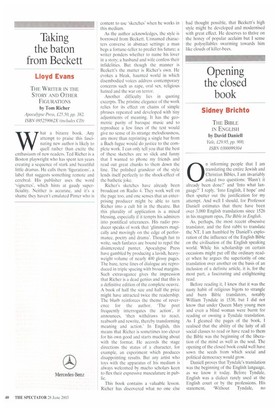Taking the baton from Beckett
Lloyd Evans
THE WRITER IN THE STORY AND OTHER FIGURATIONS by Tom Richer Apocalypse Press, £25.50, pp. 382, ISBN 095259062X (includes CD) What a bizarre book. Any attempt to praise this fascinating new author is likely to quell rather than excite the enthusiasm of new readers. Ted Richer is a Boston playwright who has spent ten years creating a sequence of stark and beautiful little dramas. He calls them 'figurations', a label that suggests something remote and cerebral. His publisher uses the word 'vignettes', which hints at gaudy superficiality, Neither is accurate, and it's a shame they haven't emulated Pinter who is
content to use 'sketches' when he works in this medium.
As the author acknowledges, the style is borrowed from Beckett. Unnamed characters converse in abstract settings: a man begs a fortune-teller to predict his future; a writer ponders whether to name his lover in a story; a husband and wife confess their infidelities. But though the manner is Beckett's the matter is Richer's own. He evokes a bleak, haunted world in which disembodied voices address contemporary concerns such as rape, oral sex, religious hatred and the war on terror.
Another difficulty lies in quoting excerpts. The pristine elegance of the work relies for its effect on chains of simple phrases repeated and developed with tiny adjustments of meaning. It has the geometric purity of baroque music and to reproduce a few lines of the text would give no sense of its strange melodiousness, any more than reprinting a single bar from a Bach fugue would do justice to the complete work. I can only tell you that the best of these sketches are so slick and funny that I wanted to phone my friends and read out great chunks to them down the line. The polished grandeur of the style lends itself perfectly to the shock-effect of the bathetic joke.
Richer's sketches have already been broadcast on Radio 4. They work well on the page too, and one senses that an enterprising producer might be able to turn Richer into a cult hit in the theatre. But this plurality of application is a mixed blessing, especially if it tempts his admirers into pontifical utterances. His radio producer speaks of work that 'glimmers magically and movingly on the edge of performance, poetry and drama'. Though fun to write, such fanfares are bound to repel the disinterested punter. Apocalypse Press have gambled by producing a lavish, heavyweight volume of nearly 400 glossy pages. The bare, terse lines of dialogue are reproduced in triple spacing with broad margins. Such extravagance gives the impression that Richer is a dead genius and that this is a definitive edition of the complete oeuvre. A book of half the size and half the price might have attracted twice the readership. The blurb reinforces the theme of reverence for the author. 'The poet frequently interrogates the action', it announces, 'then withdraws to react, reabsorb and rewrite, thereby transforming meaning and action.' In English, this means that Richer is sometimes too clever for his own good and starts mucking about with the format. He accords the stage directions the status of a character, for example, an experiment which produces disappointing results. But any artist who toys with the apparatus of his medium is always welcomed by macho scholars keen to flex their expressive musculature in public.
This book contains a valuable lesson. Richer has discovered what no one else had thought possible, that Beckett's high style might be developed and modernised with great effect. He deserves to thrive On the honey of popular acclaim but I sense the polysyllables swarming towards him like clouds of killer-bees.


































































 Previous page
Previous page